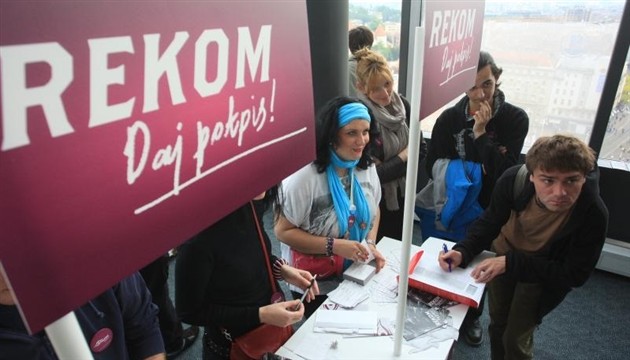
29.11.2014.
Sven Milekic for T-Portal – What Is So Controversial About RECOM?

Insider’s view
What Is So Controversial About RECOM?
I was a bit younger, an activist interested in the events of the 1990s, when I heard of RECOM for the first time almost four years ago. I soon learned that the name was the acronym of the “Regional Commission,” and that the Commission was being created by the Coalition for RECOM with over 1,600 organizations and individuals from throughout the region. The very term “Regional Commission” did not mean very much, but when I found out that RECOM was designed to deal with the facts about those killed, disappeared or otherwise suffering people from all the armed conflicts of 1991 to 2001, I realized the importance of this idea and went into action. This is how the young activist Sven Milekic begins his story about RECOM and the history of the advocacy for and controversies about this pioneering human rights initiative.
Photo: Pixsell , Autor:Boris Scitar/PIXSELL
I suppose the reaction is the same today when one first hears of RECOM, or about its “fact-finding” mission. I assume that RECOM’s unpopularity among the public stems from certain misunderstandings, as well as from some other causes.
In 2011, I participated in a campaign to secure citizens’ signatures in support of RECOM. I volunteered to stand every day on the Ban Jelacic Square in Zagreb, trying to persuade people to support an idea I considered worthy of support. However, the campaign coincided with the conviction judgment in the Ante Gotovina and Mladen Markac Case. Croatian war veterans were protesting on that very same square, seeking what they considered to be justice for the generals only a few dozen metres away from us. At the same time, we were seeking what we considered to be justice for the victims.
Since the moment was extremely inconvenient, 20,000 signatures were collected from Croatia out of the half a million signatures from all seven states of the former Yugoslavia. We were exposed to all kinds of insults in Croatia at that time: we were called “foreign mercenaries,” “British spies,” “Commies,” “Chetniks,” “pro-Chetnik youth,” and the like. We were accused of equating victims with the aggressors, of tending to relativize Serbia’s blame for the wars of the 1990s, and of insulting the dignity of the Homeland War. All the while, the civil society stood to the side, leaving us at the mercy of these insults. Although this extreme situation is not a mirror of everyday life in Croatia at the end of 2014, it is nevertheless indicative of considerable social malaise. Today, as before, we hear the same comments as in 2011, only on a smaller scale: we hear about identifying the victim with the aggressor, about soiling the dignity of the Homeland War, and about the Serbian amnesty for the wars of the 1990s.
I took note of citizens’ questions. One of them was, why were we advocating for the establishment of something that had already been established. People obviously do not know that nothing like a single, individualized record exists of the Croatian citizens killed, disappeared, detained or expelled during the war in Croatia. And by record, I mean the record of persons on both sides of the conflict.
Unfortunately, neither the public nor the state care about civilian victims of war. The civilian victims of war in Croatia today have almost no rights, and neither do the families of those 400 killed Croatian children. Because of this neglect, civilian casualties in many cases have to pay enormous legal costs, because in suing the state they are trying to obtain the benefits they deserve. RECOM exists to solve such problems.
Another problematic question was: Whose victims is RECOM designed to establish? Some citizens were even more precise, asking whether we were advocating for Serbian victims as well. On the one hand, this question can be interpreted as a kind of success, since victims from “the other side,” i.e. Serbian victims, are thereby being registered as actually existing. On the other hand, it is obvious that in the eyes of the public, “victim” is an ambiguous term. In other words, some victims do not deserve even to be named, nor are their sufferings, deaths and/or other circumstances worthy of being recorded and entered into the common fund of knowledge and information that we leave as a historical fact to future generations. However, is it not reasonable that a society should want to find out exactly what happened during the war, how many people were killed, disappeared or expelled, and what their names were? Will our knowing the identity of those who suffered cause something bad? Can this knowledge make things go backward? Isn’t such a mental and/or emotional attitude the same one we find in people who felt it was not necessary to discover and record the number of citizens of Berlin who were raped after their city had been occupied, or how many Italians ended up in the “foibas”[1]? Or even more directly: do the data about the suffering of “the other” diminish “our” suffering?
The third question was: Why a regional commission, rather than a national one? The answer is quite clear: because other states and their citizens were also involved in the wars. Unless the other party is involved, you won’t be able to establish the facts you don’t know or the facts you can’t get to by yourself. If various associations in Croatia have been urging Serbia for almost 20 years to disclose the secret sites of mass graves and documentation pertaining to Ovcara, how could Croatia on its own arrive at the complete data and facts relying solely on its own sources? It is not possible to know “the whole truth,” as it were, unless it is really “whole” and unless it includes all warring parties. This is why we advocate for a regional commission, from which all societies involved will benefit.
The idea of RECOM, as with all commissions for truth and facts, is founded on two premises. The first is, that the facts are necessary in order for the societies to face the difficult episodes of their history on a sound basis. The second is, that the right to the truth cannot be denied to anyone, especially not to the victims and/or their families.
In fact, everyone should clearly understand that not all victims will experience justice in the legal sense. Not all the perpetrators of the crimes will be punished. This is not a characteristic of “our wars” only, but of wars in general. No judiciary is so powerful as to be able to prosecute everyone and give satisfaction to all of the victims. Many people will probably be denied the right to material or symbolic reparations. The practice in Croatia has shown this to be the case. Victims will not have the legal status of a victim and hence will not receive monetary compensation and/or an apology. They probably won’t be given their place in the public space and/or in official rituals of remembrance, in the form of commemorative events, monuments or memorials. They probably won’t even enter the schoolbooks.
The least we can do, therefore, as members of these societies, is not to deny them the right to the truth and the right to tell their story. Some testimonies will be “useless” in the technical sense, as they won’t provide the consistent causal relationship required for scientific analysis. But it doesn’t matter that such testimonies will not serve those who remain unscarred by the horrors of war, but only those who have been scarred. All those who have been scarred are entitled to give their testimonies. That is the very least that they are entitled to.














